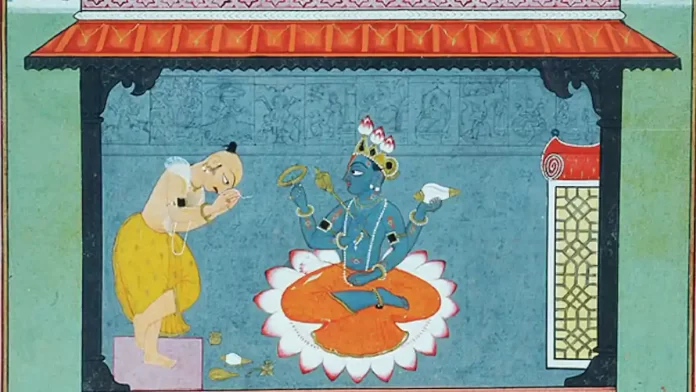Nimbarka, also known as Nimbarkacharya or Nimbarka Bhagavan, was a revered philosopher, theologian, and saint in the Hindu tradition.
He is considered one of the most influential proponents of the Dvaitadvaita Vedanta philosophy, a school of thought that harmonizes elements of both dualism and non-dualism.
Nimbarka’s teachings have left a lasting impact on Hindu philosophy and spirituality, making him a significant figure in the Bhakti movement.
Early Life and Background
Nimbarka’s exact birth date remains a subject of debate among scholars, but it is generally believed that he lived around the 7th to 9th centuries CE.
He was born in the village of Mungera, situated in the Vindhyas region of present-day Rajasthan, India.
While details about his early life are scarce, it is widely accepted that he displayed exceptional intellectual abilities and spiritual inclination from a young age.
Philosophical School: Dvaitadvaita Vedanta
Nimbarka is most renowned for formulating the Dvaitadvaita Vedanta philosophy, which provides a unique interpretation of the relationship between God, individual souls (Jivatmas), and the material world.
Dvaitadvaita translates to “dualistic non-dualism,” and it seeks to reconcile the seemingly contradictory concepts of dualism (Dvaita) and non-dualism (Advaita).
According to Nimbarka, the ultimate reality is Lord Krishna or Radha-Krishna, the divine couple, who possess both unity and duality simultaneously.
He posited that the individual souls, while distinct from God, are eternally related to Him through an inseparable bond of love.
The philosophy emphasizes the significance of devotion (Bhakti) as the path to liberation (Moksha) and the highest form of spiritual practice.
Works and Teachings
Nimbarka’s philosophical ideas are mainly conveyed through his two primary works-
- Vedanta Parijata Saurabha
- Dasashloki
The Vedanta Parijata Saurabha is considered his magnum opus, where he elaborates on the principles of Dvaitadvaita Vedanta and refutes other philosophical viewpoints of his time.
The Dasashloki, on the other hand, comprises ten verses that encapsulate the essence of his teachings.
In his writings, Nimbarka elucidates the significance of surrendering to God with love and devotion, known as Bhakti Yoga.
He emphasizes the importance of recognizing the divine presence in all aspects of life and viewing the world as a manifestation of God’s divine play (Lila).
Through Bhakti, individuals can cultivate a loving relationship with the divine and attain spiritual liberation.
Legacy and Influence
Nimbarka’s teachings found widespread acceptance and became integral to the Bhakti movement, a devotional movement that swept across India during the medieval period.
The movement sought to democratize spirituality by promoting personal, emotional connections with the divine, irrespective of one’s social or economic background.
Numerous temples and religious institutions dedicated to Nimbarka and his teachings exist across India, especially in the northern regions.
His philosophical school, Dvaitadvaita Vedanta, continues to be studied and followed by scholars and devotees alike.
Conclusion
Nimbarka’s contributions to Hindu-Brahmin philosophy and spirituality are invaluable. His Dvaitadvaita Vedanta philosophy, blending dualism and non-dualism, has enriched the understanding of the relationship between the individual soul and the Supreme Being.
Through his emphasis on Bhakti, he has inspired countless individuals to seek a deeper connection with the divine and embrace the path of love and devotion in their spiritual journey.
As we reflect on the life and teachings of Nimbarka, we find a profound legacy that continues to guide and inspire seekers of truth and spiritual seekers in the modern era.
Also Read| Ramanujacharya and Vishishtadvaita Philosophy of Hindu-Brahmanism
